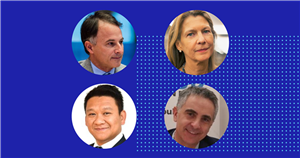HIMSS21Europe: 'Vaccine hesitancy is associated with a lack of trust in governments'

Leading global health experts examined evidence-based approaches to infodemic management and the importance of citizens having access to the right information, during the ‘From Pandemic to Infodemic, the Role of Effective Digital Public Health’ session, which was held at the HIMSS21 European Health Conference today (8 June).
The speakers were: Carlos Mateos, director at the COM Salud/Instituto #SaludsinBulos, Spain; Prof Heidi Larson, professor of anthropology, risk and decision science, dept. infectious disease epidemiology London School of Hygiene & Tropical Medicine, UK; Tim Nguyen, head of unit high impact events preparedness at the WHO, Health Emergencies Programme, Switzerland; and Prof Jeffrey V Lazarus, associate research professor, head of the health systems research group at the Barcelona Institute of Global Health (ISGlobal) Spain.
Healthcare professionals must play their part
The UK and the WHO have recently collaborated to manage the infodemic, and distribute content to combat the spread of misinformation through a series of communication campaigns. This has not been the first initiative. ‘Stop the Spread’ was rolled out on BBC World television, website and apps last year to raise the public’s awareness of the misinformation around COVID-19. ‘Reporting Misinformation’ was also launched in August 2020 to verify the information and report misinformation to various social media platforms.
However, the responsibility also falls on healthcare professionals to counteract misinformation with reliable sources. Furthermore, recent research shows that 10 percent of healthcare workers have a social media account. “I think that it’s a big gap,” conceded Nguyen. “Health care workers are the most trusted form of knowledge that individuals go to to have health-seeking advice.”
Adding that their social media presence would serve to boost confidence in patients, Nguyen explained: “I think there is already an opportunity now that we need to hear the good voices as well.”
Mateos added: “I think there are a lot of health professionals that can do the same individually or with the scientific societies, in media, in social media, but also with the patients one to one.
“We know there are a lot of studies that say when you communicate well with your patient, you are going to have a patient that is going to believe you and is not going to believe conspiracy theories. We have to train these health professionals to communicate better with the patient in front of them on a screen and in social media.”
Vaccine hesitancy
The pandemic has highlighted the importance of accurate information, particularly at a time when we are inundated with misleading information and mixed messages. We have recently witnessed this impact on the global vaccine rollout, which has affected the uptake, during a time where stakes of vaccination programmes are high.
Professor Lazarus said: “We found that the hesitancy is associated with a lack of trust in governments and where trust was higher, vaccine confidence at a country level tended to be higher. Increased effective communication from government in the health sector can help the public understand the importance of vaccination.
“There’s not just a need for increased public trust in vaccines, but for increased public health community understanding of the dimensions of COVID-19 vaccine hesitancy.
“Without this, we can’t really develop the messages and the tools needed to effectively control the pandemic and protect the population.”
Professor Larson added: “We did a further global study on the willingness to take a COVID vaccine in 32 countries. This was in December 2020. […] Those who felt the government response to COVID was good – they had confidence in it was the strongest predictor of people’s willingness to take a vaccine.”
Utilising technology access
The latest polls show that about 54% of the population have stable internet connection. Discussing the global rise in internet and technology access, Nguyen said: “We must cope with and understand and learn how to manage this as part of the infodemic.
“We are living in two intertwined worlds now. In the physical world, but also in a virtual world. We take information from the virtual world into our physical world, and vice versa. I think this is a new phenomenon and new information ecosystem.
“It’s still to come on social media. We really need to anticipate this increase, it will not go away, it will even further expand. I think we need to establish interventions to manage the infodemic.”
Building resilience amongst populations
The panel also gave practical ways patients and healthcare providers can combat the age of misinformation. Nguyen said: “We need to promote the resilience to misinformation. We cannot counteract any misinformation, fake news, disinformation out there. What we need to do is build resilience to this so populations see and understand themselves when they see something that is not correct.
“First, we establish a global framework on how to manage the COVID-19 for an infodemic. This includes 50 Global actions, whole of society approach, where different parts of communities in the private sector, public sector and government sector, in academia, in media, in journalism can take to do their part in managing the infodemic.
“The second thing we did is we tried to build the scientific evidence around these interventions to really understand what interventions actually work, what kind of misinformation debunking has an impact of change.”
Access the ‘From Pandemic to Infodemic, the Role of Effective Digital Public Health’ session, from #HIMSS21Europe.
Healthcare IT News is a HIMSS Media publication.
Source: Read Full Article